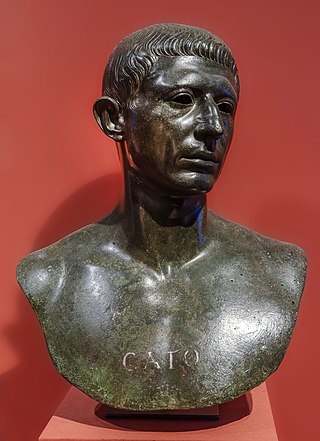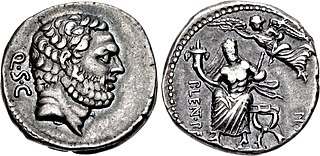
The First Triumvirate was an informal political alliance among three prominent politicians in the late Roman Republic: Gnaeus Pompeius Magnus, Marcus Licinius Crassus, and Gaius Julius Caesar. The republican constitution had many veto points. In order to bypass constitutional obstacles and force through the political goals of the three men, they forged in secret an alliance where they promised to use their respective influence to support each other. The "triumvirate" was not a formal magistracy, nor did it achieve a lasting domination over state affairs.
Gaius Asinius Pollio was a Roman soldier, politician, orator, poet, playwright, literary critic, and historian, whose lost contemporaneous history provided much of the material used by the historians Appian and Plutarch. Pollio was most famously a patron of Virgil and a friend of Horace and poems to him were dedicated by both men.
Titus Annius Milo was a Roman political agitator. The son of Gaius Papius Celsus, he was adopted by his maternal grandfather, Titus Annius Luscus. In 52 BC, he was prosecuted for the murder of Publius Clodius Pulcher and exiled from Rome. He was unsuccessfully defended by his friend, Marcus Tullius Cicero, in the speech Pro Milone.
Publius Clodius Pulcher was a populist Roman politician and street agitator during the time of the First Triumvirate. One of the most colourful personalities of his era, Clodius was descended from the aristocratic Claudia gens, one of Rome's oldest and noblest patrician families, but he contrived to be adopted by an obscure plebeian, so that he could be elected tribune of the plebs. During his term of office, he pushed through an ambitious legislative program, including a grain dole; but he is chiefly remembered for his long-running feuds with political opponents, particularly Cicero, whose writings offer antagonistic, detailed accounts and allegations concerning Clodius' political activities and scandalous lifestyle. Clodius was tried for the capital offence of sacrilege, following his intrusion on the women-only rites of the goddess Bona Dea, purportedly with the intention of seducing Caesar's wife Pompeia; his feud with Cicero led to Cicero's temporary exile; his feud with Milo ended in his own death at the hands of Milo's bodyguards.

The gens Claudia, sometimes written Clodia, was one of the most prominent patrician houses at ancient Rome. The gens traced its origin to the earliest days of the Roman Republic. The first of the Claudii to obtain the consulship was Appius Claudius Sabinus Regillensis, in 495 BC, and from that time its members frequently held the highest offices of the state, both under the Republic and in imperial times.

Marcus Porcius CatoUticensis, also known as Cato the Younger, was an influential conservative Roman senator during the late Republic. His conservative principles were focused on the preservation of what he saw as old Roman values in decline. A noted orator and a follower of Stoicism, his scrupulous honesty and professed respect for tradition gave him a powerful political following which he mobilised against powerful generals of his day.

Publius Cornelius Lentulus Spinther was a Roman politician and general. Hailing from the patrician family of the Cornelii, he helped suppress the Catilinarian conspiracy during his term as curule aedile in 63 BC and later served as consul in 57 BC. Denied the opportunity to invade Egypt the following year, he nevertheless won some victories in his province of Cilicia and celebrated a triumph over it in 51 BC.
Marcus Calpurnius Bibulus was a politician of the Roman Republic. He was a conservative and upholder of the established social order who served in several magisterial positions alongside Julius Caesar and conceived a lifelong enmity towards him. In 59 BC, he was consul alongside Julius Caesar. Their partnership was contentious to the extent that Caesar's supporters assaulted Bibulus in Rome's main forum on the eve of an important vote. Bibulus withdrew from public politics for the rest of his term.
Lucius Marcius Philippus was a politician and senator in the late Roman republic. He was governor of Syria from 61 to 60 and later served in the consulship of 56 BC. He was also step-father of the emperor Augustus.

Quintus Caecilius Metellus Pius was a general and statesman of the Roman Republic. Like the other members of the influential Caecilii Metelli family, he was a leader of the conservative faction, the Optimates, who opposed the popular faction, the Populares, during the last century of the Roman Republic.
Publius Plautius Hypsaeus was a politician of the Roman Republic during the first century BCE.
Publius Vatinius was a Roman politician during the last decades of the Republic. He served as a Caesarian-allied plebeian tribune in the year 59 – he was the tribune that proposed the law giving Caesar his Gallic command – and later fought on that side of the civil war. Caesar made him consul in 47 BC; he later fought in Illyricum for the Caesarians and celebrated a triumph for his victories there in 42 BC.

Gaius Porcius Cato was a Roman politician and general, notably consul in 114 BC. He was the son of Marcus Porcius Cato Licinianus and grandson of Cato the Censor.
Quintus Caecilius Metellus Nepos was an ancient Roman politician during the Late Republic. He was a son of Quintus Caecilius Metellus Nepos and served as tribune of the plebs in 62 BC, consul in 57 BC, and the governor of Hispania Citerior from 56–55 BC.

Quintus Caecilius Metellus Pius Scipio, often referred to as Metellus Scipio, was a Roman senator and military commander. During the civil war between Julius Caesar and the senatorial faction led by Pompey, he was a staunch supporter of the latter. He led troops against Caesar's forces, mainly in the battles of Pharsalus and Thapsus, where he was defeated. He later committed suicide. Ronald Syme called him "the last Scipio of any consequence in Roman history."

The gens Porcia, rarely written Portia, was a plebeian family at Ancient Rome. Its members first appear in history during the third century BC. The first of the gens to achieve the consulship was Marcus Porcius Cato in 195 BC, and from then until imperial times, the Porcii regularly occupied the highest offices of the Roman state.

The history of the Constitution of the Roman Republic is a study of the ancient Roman Republic that traces the progression of Roman political development from the founding of the Roman Republic in 509 BC until the founding of the Roman Empire in 27 BC. The constitutional history of the Roman Republic can be divided into five phases. The first phase began with the revolution which overthrew the Roman Kingdom in 509 BC, and the final phase ended with the revolution which overthrew the Roman Republic, and thus created the Roman Empire, in 27 BC. Throughout the history of the Republic, the constitutional evolution was driven by the struggle between the aristocracy and the ordinary citizens.
Marcus Porcius M. f. M. n. Cato was the father of Cato the Younger. His promising political career was cut short by his sudden death, early in the first century BC.
Gaius Scribonius Curio was the son of Gaius Scribonius Curio, consul in 76 BC and censor in 61 BC. His political allegiances changed over the course of the 50s BC until his tribunate, when he sided with Julius Caesar after possibly receiving a massive bribe. During the civil war, he sided with Caesar and led Caesarian troops to Sicily and then to Africa, where he was killed in battle.








